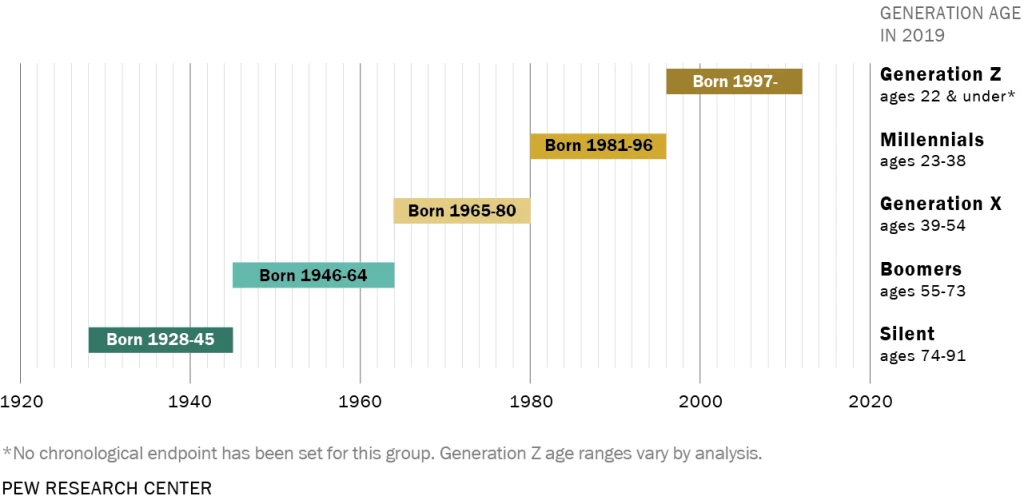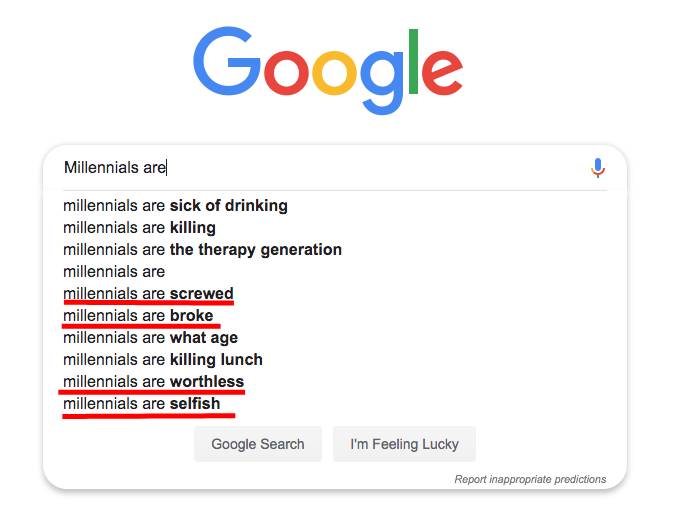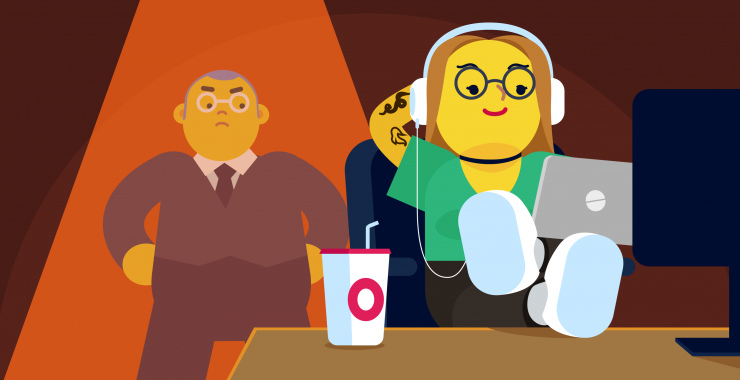My close relative (a baby boomer) works in the concert business. He says he’s hired plenty of millennials—and they are all useless. “Hard to please,” “impossible to understand,” “lazy,” “entitled,” and “job hoppers”—these are just a few epithets he applies to this age cohort.
Recently, I wondered: Is he right?
Homer Simpson ‘born’ in 1987 is a popular cartoon millennial.
At Chanty, as you probably know, we are designing a great team chat.
However, not only technology captures our attention. We also strive to learn how to better understand and connect with each other.
So, when it comes to millennials, how could we do great business with them? Is there a way to become thoroughly familiar with this age group? And maybe, just maybe, we could even have fun doing it?
Muppet Kids series were very successful among millennials
I’ve researched the topic of millennials for a couple of weeks. Now, I’m glad to share with you 3 tips on how to approach them. These bits of advice are based on some prominent studies, as well as on my psychology training and personal experience.
Maybe you are managing millennials? Or you have them among your co-workers or clients? What management styles do you stick to? Hopefully, after reading this article, you’ll approach anyone from this age group with more joy and productivity.
At the end of the day, you might find approaching millennials is much simpler than you thought.
Who are Millennials?
The best definition of millennials I’ve found so far is given by Pew Research Center.

In a nutshell, millennials are those who came into adolescence in the 2000s. The year 1996 is usually marked as a final birth year for them. Later, GenZers stepped into the game, while before the 1980s Baby Boomers were in the spotlight.
Let’s zoom out more for a bigger picture. (Just for the record, GenY and Millennials mean the same age cohort).
 pewresearch.org
pewresearch.org
Among the most important facts about millennials usually mentioned, I’d outline the following:
- This generation is the biggest in US history.
- Lower employment levels and smaller incomes left younger Millennials with less money than previous generations.
- Millennials have been putting off some major purchases (houses, cars), as well as the significant milestones like marriage and children.
Now, let’s move to a deeper review, where I’ll provide you with some bits of advice as promised.
3 tips on how to approach millennials
1) ‘Lazy’, ‘sloppy’ and ‘unhappy’? Abandon stereotypes.
If you type “millennials” into your Google search bar, “screwed,” “worthless,” “selfish,” and many other not-so-flattering adjectives will probably follow your query. The question is: do these descriptions jibe with the facts?
 These descriptions may be true about some millennials. But I think you’ll agree that they sound more like stereotypes and labels.
These descriptions may be true about some millennials. But I think you’ll agree that they sound more like stereotypes and labels.
The EY research, one of the biggest studies on challenges across generation, proves millennials are not some sloppy ego trippers. Actually, they are highly committed to their careers. Some even call them “Generation Go”—companies need to keep pace with them or risk losing out on their talent.
Not only millennials want to benefit their career, they also desire to contribute to the world, longing for leaders who’d share this intention with them. Simply put, millennials want to benefit their community and people close to them.
Tom & Jerry – another favorite cartoon of many millennials.
Gif source
What does it say to those interacting with millennials? Firstly, it means we can talk to them in terms of values, mission, and vision. Chances are we’ll be on the same wavelength.
For example, If you are a CEO, a manager, or a team lead trying to retain a millennial, you may point out the business you are running is socially responsible (I hope it is!). Consider emphasizing that your projects benefit the community and the world.
As Ashira Prosac puts it, corporate social responsibility is a top priority for Millennials. The more a company gives back to the community, the happier your Millennial employees are.
In case millennial is your peer, e.g. a colleague, be sure to look for a win-win solution in every situation. Your collective decisions should benefit your community and the world.
Neglect any stereotypes that might act like self-fulfilling prophecies. Be sure you could do great business together. Then chances are that you’ll succeed.
2) Provide no rigid framework. Embrace freedom.
In my circle of acquaintances, 6 in 10 people have distant jobs. In fact, my co-worker just published a Facebook post saying she’s fed up with nine-to-five chains and sets off to Goa to work and have fun.
OK, that might not be her. That’s Rihanna (another millennial, btw). However, I used this GIF to introduce a need everyone actually has, but Millennials are especially sensitive to. I’m talking about the longing for freedom and flexibility.
Of course, not all millennials have the liberty to leave for Goa. As mentioned earlier, most of them are actually financially challenged. But no matter the social status, they require enough time and space for their needs.
So here’s a tip for anyone in a managing position. The suggestion appears from the massive Deloitte Millennial Survey. It says we should create the workplace with higher degrees of flexibility. This might include offering tasks diversity, no fixed working hours, distant or part-time work using team chats.
Experts even suggest you might help millennial workers pursue their side hustles! It can actually benefit everyone.
There’s one caution, though. Real freedom is possible only when some clear boundaries are established. So be sure to set up measurable goals and KPIs.
Lastly, if a millennial is your co-worker, keep in mind that offering flexibility in your transactions when possible, you might benefit your relationship.
3) Connect – online and offline. Set up communities.
Do you remember your first instant message ever? Probably it was just ‘Hi’ or ‘All right?’. But I bet you never thought it would be a milestone for your communication.
First, there were PowWow, ICQ, or AOL Instant Messenger. Then Facebook, WhatsApp and HipChat came into the scene. The rise of social media and chat apps fell in the 2000s, which is exactly the time when millennials stepped into adulthood.
ICQ was the first chat program for many millennials.
In a word, millennials are the first digital natives, as emphasized in the Goldman Sachs research. In this light, being connected might be the third most important thing for them, apart from making a positive change and having enough freedom.
How do we connect with millennials? Apart from understanding and emphasizing with them, we might get to know them a little bit more. It doesn’t necessarily mean being their best friends. But maybe we could become a bit closer to each other instead of staying in separate cubicles forever.
Chris Tuff in his book ‘Millennial whisper’ recommends connecting with your millennial teammates on social media. Do you think workers would feel strange having you as a friend on Facebook? Well, it is ‘a tell-tale sign that you need to build stronger relationships with them,’ Tuff concludes.
Better connections lead to a greater sense of camaraderie, which is no less important for millennials. Experts say it’s not about perks anymore. A good company culture that shows through in the workplace is crucial to attract and retain the millennials.
Wrapping up and going beyond age concepts
I’ve offered 3 bits of advice on how to interact with millennials:
- Let go of the stereotypes. Studies show millennials are highly committed to their careers and keen to have a positive impact on their community. Keep that in mind when communicating or negotiating with your co-workers in this age group.
- Be flexible. Freedom and ability to change in order to suit different life contexts are of the essence for millennials. Embrace flexible work approaches and diversity at the workplace.
- Connect with millennials and build some great communities. Being the first digital natives, they strive for the sense of camaraderie. You might consider getting in touch with them on social media more often.
At the same time, whatever age cohort we all are from, the differences between us might not be that important. Maybe next time you are interacting with a millennial, here’s what you can do.
Put aside anything you know about them. Take a deep breath and see a usual, regular human being in front of you. Don’t pay too much attention to their age at birth. They are just the same person as you. They want to benefit the world, strive for career advancement. They’d like to have a good salary and their achievements to be acknowledged. You might differ in some ways, but you are also similar in many ways. So you don’t have to bother much about the distinction between you two. Breathe, meet, connect… Chances are, you’ll enjoy your collaboration much more now.









Add comment